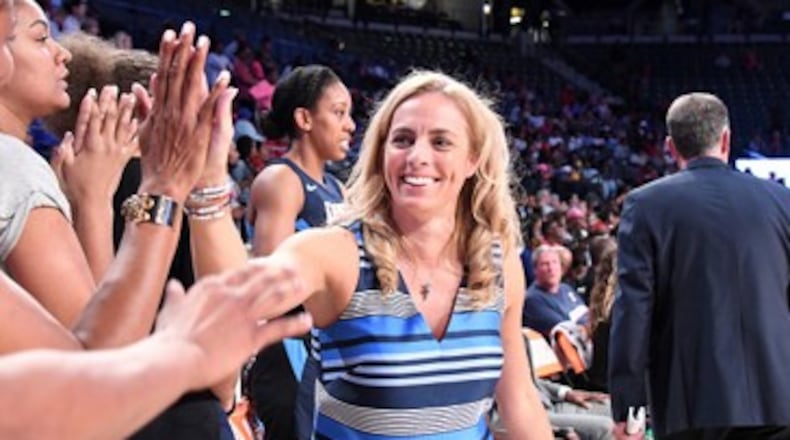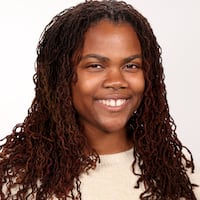Following a disappointing 2019 season and what seemed like a slow start to WNBA free agency, the Dream have made a splash this week.
The latest announcement came Wednesday when the team completed a three-team trade to acquire Georgia native Courtney Williams, who emerged as a star during the 2019 playoffs and was considered a crucial piece to the Connecticut Sun returning to the league finals.
Since the free-agency period began a week ago, the Dream offered deals to Indiana's Tiffany Mitchell and then-Chicago's Astou Ndour. Both players were restricted free agents, and the players' respective teams matched the deals. The team signed Shekinna Stricklen to a two-year deal and Glory Johnson to a one-year contract and acquired Kalani Brown.
The team has let go of Angel McCoughtry, Jessica Breland, Alex Bentley, Brittney Sykes and Marie Gülich.
The Atlanta Journal-Constitution spoke with Dream coach Nicki Collen following the announcement of the latest trade.
“Every move had a strategic plan behind it,” Collen said.
This Q&A has been edited for clarity.
Q: What are your thoughts on your WNBA free-agency moves thus far?
A: We obviously identified needs we had a year ago and from this past season and kind of knew we needed to get scoring and shooting. And so I think we've acquired that really with all of our movement. From Glory, who I think can be that stretch four and can handle it. To (Shekinna) Stricklen, who is arguably one of the best, if not the best three point shooters in the league. And then Courtney just gives us that dynamic scorer that can do a little bit of everything, but is probably the best mid-range shooter in the WNBA. I think we're going to add a lot of personality, a lot of joy. I think we're gonna be fun to watch. So I think we've accomplished a lot of our goals that we set out to with this free agency.
Q: The Dream gave up Jessica Breland and Nia Coffey, who you acquired in 2018 and 2019, respectively. What is it like to lose those players? What is the decision making to like, kind of have to give up a couple players to get more?
A: Jessica Breland was one of the first people to say yes to me as a head coach and you know obviously had one of her best seasons two years ago when she made the All-Defensive first team. It was a stabilizer for us, and it's hard to give up good pieces, but you know, I think sometimes you have to look forward and you know, I think the situation for her, playing with (Brittney) Griner and you know with Diggins-Smith is going to be a positive for her as well in terms of her skill set and how it fits in there with kind of the retirement of Sancho Lyttle and Camille Little. I think there's huge opportunities for her to go in and play in that post tandem with Griner. Coffey did everything we asked her to do. I mean, she's a player that's still making that transition from the four to the three. She was our most efficient 3-point shooter a year ago. And so, we asked her to develop that part of her game and to look for it, and I think she did. You have to give up something to get somebody, you know, the quality of player as Courtney Williams is, and so it's never easy.
Q: You’ve acquired two players (Stricklen and Williams) that played in the WNBA Finals in 2019, from a team where you previously were an assistant coach. How did you make that happen?
A: Courtney's obviously from Georgia, and I'll certainly leave it up to the interviews with her to get to like, why she wanted to be in Atlanta. I think for us, she was obviously the cherry on top, that type of thing. Stricklen was an unrestricted free agent and certainly as someone that I knew and had worked with. It was easy to have a conversation with her and knew that once Connecticut acquired DeWanna Bonner, that there might be opportunity for us to get her. So sometimes you have to like be willing to let the process unfold. It doesn't mean that we didn't have Stricklen as the No. 1 shooter on our board going into free agency, but that doesn't mean you can always make it happen. I think it helped to have coached her in the past for us to already have a relationship and for her to understand that I know how to get her shots, and I know how to utilize her, so I thought that was important.
Q: How do you see your other acquisitions working on the court?
A: We wanted Glory Johnson from the beginning, even if we had gotten (Astou) Ndour, because see them as different type (of) players, but both very, very good. Being able to get Glory gives us that versatile power-forward player that can guard multiple positions, which everybody knows I love. You know, Kalani (Brown) obviously gives us the size that we need to compete with the Griners and the (Liz) Cambages and the (Teaira) McCowans of the league. So kind of every move had a strategic plan behind it. You just kind of make one and then you try to make the next then, it's a series of moves to try to improve the roster.
Q: You also claimed Alexis Jones off of waivers. What did you see with that pickup?
A: I did a lot of research on Alexis. Obviously, as someone who was waived, we had a right a first refusal on her and you know, spent a lot of time talking to former teammates, her agent, her. That 48 hours, I did a ton of research, watched every shot she's taken in the WNBA, an analytical dive really, and looked at her threes in terms of her ability to make 3's and what types of 3's she's taken. And you know, for us right now, in that we're not re-signing Alex Bentley, she provides kind of a combo guard. From a skill perspective, she's got a lot of really good tools and has shown glimpses of it in the (WNBA), but you know, hasn't had a consistency to it or even a consistency to her playing time. The more research I did, I felt like was was low risk and potentially high reward.
Stay tuned for more Atlanta Dream updates throughout the WNBA’s free-agency period.
About the Author
Keep Reading
The Latest
Featured


